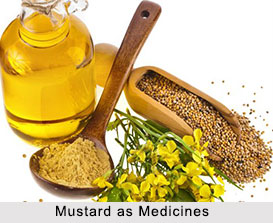 Mustard seeds have been highly prized culinary oil-seeds being in use since earlier times. The mustard seeds and its oil have traditionally been used to relieve muscle pain, rheumatism and arthritic pain. Two varieties of mustard are mentioned by Sanskrit writers, namely, "siddhartha" or white mustard, (Sinapis glauca of Roxburgh, Brassica campestris, L.) and "rajika" or dark brown variety, (Sinapis ramosa of Roxburgh, Brassica juncea, Hooker, fil, et Thomson). The latter is more pungent and preferred for external application as a rubefacient.
Mustard seeds have been highly prized culinary oil-seeds being in use since earlier times. The mustard seeds and its oil have traditionally been used to relieve muscle pain, rheumatism and arthritic pain. Two varieties of mustard are mentioned by Sanskrit writers, namely, "siddhartha" or white mustard, (Sinapis glauca of Roxburgh, Brassica campestris, L.) and "rajika" or dark brown variety, (Sinapis ramosa of Roxburgh, Brassica juncea, Hooker, fil, et Thomson). The latter is more pungent and preferred for external application as a rubefacient.
Health Benefits of Mustard
Mustard is used externally, alone, or in combination with other medicines in a great variety of diseases, and notably in parotitis, sciatica, paraplegia, gout, inflammatory swellings, urticaria, etc.
Mustard oil is largely used by the natives for culinary purposes as well as for anointing the body before bathing. Mustard oil anointment is said to keep the body cool, and the skin soft, to promote the growth of hair and to remove prurigo, lice and scurf. The leaves of the mustard plant are used as a pot-herb, and considered pungent and stomachic.
Dose of Mustard in Medicine
Mustard enters into the composition of emetic mixtures, of which the following is an example. Take mustard seeds, Acorus Calamus root (vacha), bark of Symplocos racemosa (lodhra), and rock salt, equal parts. Powder it and mix. Mustard forms an ingredient of several prescriptions for loss of appetite, indigestion, etc. Thus take mustard seeds, cumin seeds, fried asafoetida, ginger and rock salt, equal parts. Powder it and mix. Dose: grains 22 with buttermilk.
Sarangadhara recommends the following application in urticaria; take mustard seed, turmeric, patchuk root, sesamum and the seeds of Cassia Tora (chakramardaka) in equal parts and rub them together into a paste with mustard oil. In gout, sciatica, etc, simple mustard plasters are used. In inflammatory affections, the following poultice is prescribed by Sarangadhara; take the root of Boerhaavia diffusa (punarnava), wood of Berberis Asiatica (daruharidra), root of Moringa pterygosperma (sobhanjana), ginger and mustard seeds in equal parts and rub them into a paste with fermented rice water.
This article is a stub. You can enrich by adding more information to it. Send your Write Up to content@indianetzone.com
Related Articles
Ayurveda
Ayurveda Medication
Elements of Ayurveda
Concepts of Ayurveda
Ancient Literature of Ayurveda




















